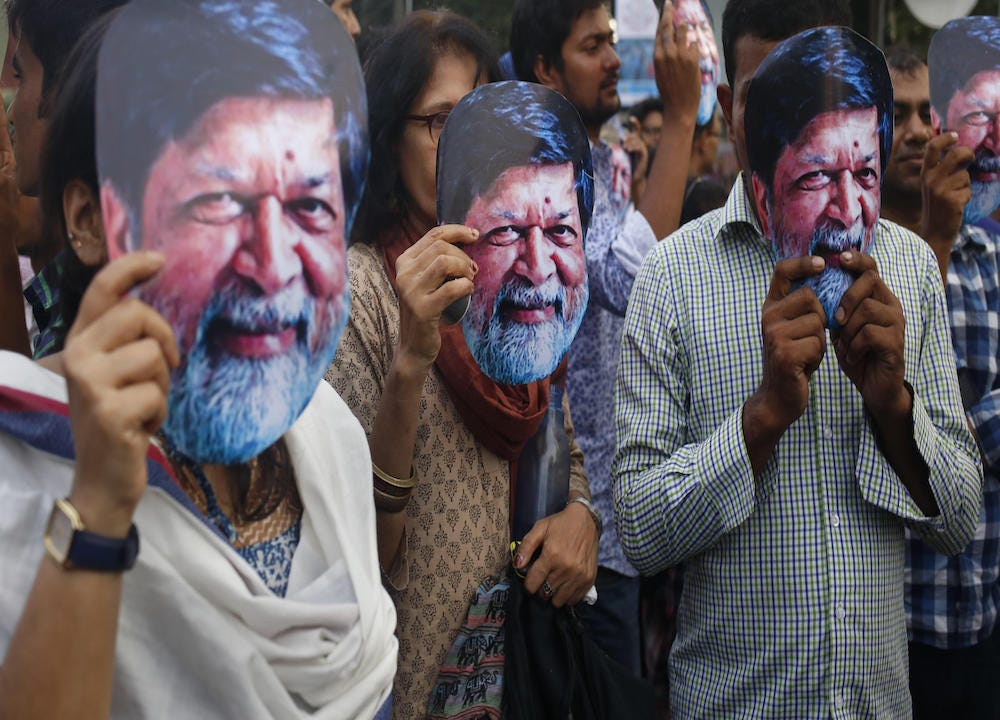
On Monday, Sheikh Hasina, the Bangladesh prime minister made some remarks on freedom of speech at her Cabinet meeting which seems aimed to defend her government’s hard line position on criticism which has resulted in so many people being detained and imprisoned.
She is quoted in BSS (Bangla)*, the state run news agency, as saying:
“There are some intellectuals who are carrying out false propaganda campaign to create anarchy. If any actions are taken against them, it is claimed that freedom of speech is being undermined. Is creating conflict also freedom of speech? That is what I want to say.”
and
“If someone spreads propaganda, we have to immediately protest. If we sit silent, it will not help. Neither will it help if we become defensive.”
and
“In today’s digital Bangladesh anyone can say whatever he or she wishes on social media and spreads propaganda, but when government takes any step against the wrongdoers, the vested quarters start hue and cry and propagate falsehood across the globe. …. People usually do not look into the matter why the step has been taken.”
and:
“A section is always there who wants to hurt the society and the government. They don’t care about people’s lives even, because they have other intentions. When [we try to] control them or [when they] fail to succeed in their conspiracy, [they] start criticism.”
Taken together, Hasina is in effect saying: If you write or say things against our government, it is part of a “false propaganda campaign” and we are not only entitled to take action against against you, but we should do so “immediately”.
This should be no surprise to the many people who have been arrested under the now repealed Information and Communication Technology Act 2006 and the new Digital Security Act 2018 for writing critical commentary or journalism about the government or its officials — and find themselves, detained in prison for at least 3 months, with their lives upended, before obtaining bail. It is the reason why the country’s media has become so constrained and self censoring, and why general people are now very careful what they say or write or indeed — in today’s world of social media — ‘share’, ‘like’ or ‘retweet’. And it is why the government has put so much effort in trying to stop independent media platforms like Netra News from being read or seen in Bangladesh
For Sheikh Hasina, the principle of “Freedom of Speech” seems only to mean the freedom to speak positively about her own Awami League government.
Ironically, despite all of Hasina’s protestations about “false propaganda”, it is in fact her government agencies — including the military intelligence agency DGFI, under her control — which are probably the most prolific purveyors of false information and propaganda within the country. These agencies work with pro-government journalists and media or create websites to publish countless false stories (like this one, for example). This of course is the kind of false propaganda — the kind of freedom of expression, in fact — that Sheikh Hasina actually supports.
There is of course fake news and obnoxious content published by those critical of Sheikh Hasina and her government but when articles or comments do — it should be called out, as Netra News does — and not result in detentions and arrests. This is particularly so when the government is distributing its own fake stories all the time.
Moreover, it is important to note that the Bangladesh government’s fake stories can be be far more dangerous — as often they are not written just for websites and media but for the police First Information Reports and criminal charge sheets. People in Bangladesh are not just imprisoned because they write something critical of the government – “fake propaganda”, as Sheikh Hasina likes to put —under the Digital Security Act; they are imprisoned also because the government’s false stories get written into police reports.
* Apparently, it was briefed by the Cabinet Secretary. There are some slightly different translations of the quotes given in some English language newspapers.
//DB
